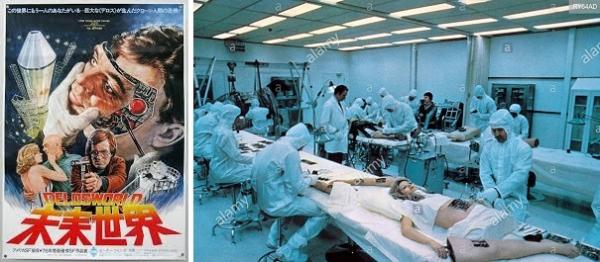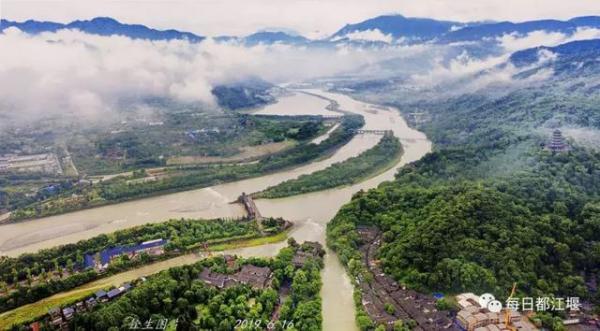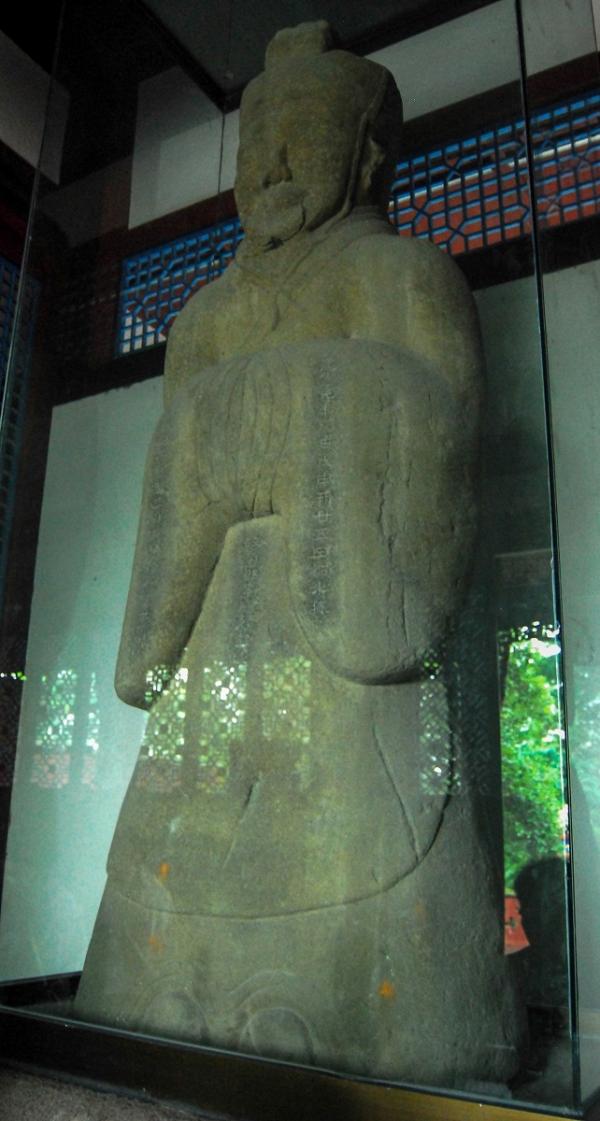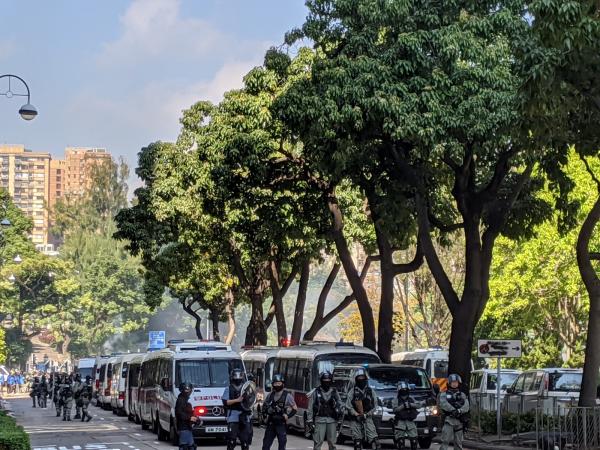Death and Eternal Life
Last week, I had a call with my father in China. He mentioned death, and I felt heavy-hearted right away. He is in his late 80s and has always been very healthy relative to his age group, but he recently started to have issues with walking. On the call, he said that he sometimes thinks about death and that he wants to see my kids more. When he was saying those things, an invisible dark cloud overshadowed both of us. He reminded me that death can strike any person in the world at any time, and my loved ones are no exception.
The issue of death always comes up like that, unpleasant and often unexpected, but you know deep in your heart that it is unavoidable. Death is indeed gloomy and heavy. When you start to think about it, it takes over your whole mind, squeezing out all other thoughts. When I was young, I tried countless times but did not find a way to ‘solve and put away’ death. Now I am already convinced, only because all previous attempts have failed, that there is no ‘solution’ to death. I have to live my life with this unsolved problem in the back of my mind, like a cancer patient pretends everything is fine but knows that he has a terminal illness.
A. Fear of Death during Childhood
1. Butchering a Bull
The first time I really thought of death happened when I was about 5 or 6 years old. My family just returned to the city of Jilin from a remote village, and I was not in grade school yet. At that time, China was still in the political madness that Mao Zedong created. Mao was anti-intellectual, and my hometown was extreme even in Mao’s China. My parents were college ‘teachers’, because the government had abolished the title of professor from all universities. Mao called for all intellectuals to be ‘re-educated’ by peasants, and my hometown government sent my parents to grow corns, soybeans and sorghum shortly after I was born. The plan was to turn them into peasants permanently. During the next several years, China was in political turmoil. Mao got into a deadly political fight with his No. 2 guy. Long story short, Mao’s policies partially collapsed, and my parents were given back their old jobs in the city.
One night, my father was causally talking about his experience in the village. He was a healthy and smart guy. He thought he would be a peasant for the rest of his life and so tried to participate in everything and learn every skill in the village. He told the story that he was helping a cattleman family butcher a bull. Chinese peasants at that time were extremely poor, and many literally had nothing. Bulls were main working force in the field and were considered very precious. The village, or the ‘commune,’ had all the bulls, which might be 2 or 3 in total, and delegated each to a cattleman family, which took care the bull for its whole life and typically treated it like a member of the family. Peasants never raised a bull only for the meat and would never kill a bull when it could still work in the field. Only when it became old or sick, they would kill it for the meat.
My father said that, before the killing, the bull actually understood the situation and also knew the people who were about to kill it, because it had worked along the family for its whole life, which was about 15 years, and they were its family too. So, when the people were busy preparing knives and utensils for the killing, the bull quietly stood on the side, with large drops of tears running out of its big eyes.
Soon after the story, our whole family went to sleep. There was no TV or computer, and the electric supply was sparse and expensive. Probably nobody knew that I did not fall asleep at all that night. I had a lot of thoughts and tears in the pitch dark. I still remembered the people, the bulls and the general setting of the village. I thought it was so unfair to the bull, who had worked its whole life for the family but was killed by them in the end. I imagined that the kids in the family grew up together with the bull. They must have been friends from a very young age, yet after the kids grew up, they would kill the bull with their own hands, just for the stupid meat!
That was a big lesson for me. Life is cruel, and death represents the ultimate cruelty of life. The idea of death hit me hard that night, and I was in utter despair. I had to find a ‘solution’ to death, otherwise, the crushing hopelessness it brought would literally stop me from carrying out my daily routines. For the next several years, whenever I inadvertently thought of death, I secretly hoped that I would become the first ever human being who never dies. Why do I have to die? I felt no sign that I would die. I was very happy and became physically stronger with every passing day. Actually, I felt I was further away from death as time went by, and there was no reason for me to think the situation would change. Sadly, it was hard to maintain such confidence for long, especially after I watched the move Futureworld.
2. Futureworld
When I was about 10 or 11, I watched Futureworld, an American sci-fi movie. An evil company makes very realistic humanoids that ordinary people cannot tell they are robots. On surface, the company operates an amusement park to allure people in. In reality, the company kills the important ones after they come in, and replaces them with robots that look, feel, and behave exactly like them. Even their families and friends cannot tell the difference. The company then sends those robots back to the society to control the world. The two heroes in the movie are about to be killed, too. While fighting for survival, they learn to pick out robots from people by looking deep into their eyes. Eventually, the two defeat the powerful company and save the world.

Fig. 1: The left is an official Poster of Futureworld. There is no flesh or blood beneath a man’s skin, but all gadgets and wires. The right is the company’s secret lab that makes such humanoids. (Pictures from Internet)
It is undoubtedly the scariest movie I have ever seen! It struck something deep inside me that I could not verbalize at the time. I thought everyone else must be scared too, but other people thought it was just a funny movie. The movie stayed on my mind for many years. It scared me because it struck down one of my fundamental assumptions of life. I instinctively thought that my life is ‘anchored’ to the people surrounding me. If my parents, siblings and friends know me and love me, I am safe, and my life is meaningful. In Futureworld, however, your family and friends still ‘know’ and ‘love’ you, but you are actually already dead secretly.
My fear from this movie went so deep that it led to phobias. I started to fear being alone in any dark place, because the swap between me and a humanoid could happen there. My family lived on the 3rd floor of an apartment building, and there was no light in the stairways. When I needed to go back home after sunset, I would wait at the door of the building for some incoming neighbor and would follow him or her, pretending it was all coincidental. Often the neighbor stopped on the 2rd floor, and I would make an excuse to go to their apartment first and keep an eye on the hallway for the next neighbor to go to the 3rd floor.
This extreme fear went on for many years, Gradually, I did get out of it, purely through youthfulness. At that age, I was often crazily happy during the day, and I carried the happiness deeper and deeper into the night as time went on. The childhood happiness squeezed the fear out of my mind bit by bit. However, it never completely left me. It just moved to the back of my mind. I always knew there was an issue about death hidden deep in my mind, intellectually unsolved and emotionally untouchable, while I was having an outwardly normal life.
3. Railcar Scare
I was close to death a few times. The one time that is most relevant to this article happened when I was in middle school. The schoolyard was at the foot of mountains, and a rail track passed between the front gate and the mountains. Often in the afternoon, I would walk out of the campus, against the school rules, into the mountains, just to wander around alone. One day I was walking on the rail track. I watched the sleepers beneath my steps, while contemplating or daydreaming. The repetitive and never-ending pattern of the sleepers must have a mesmerizing effect, and I was lost in my thoughts until a very loud squeaking sound awakened me. I turned my head and saw a bus-like single railcar rushing to me from my back. I jumped out of the track just in time for it to pass by. The railcar was braking and whistling crazily, and its steel wheels were stuck and were sliding on the steel track, making the high-pitched sound. Several people on the railcar protruded their heads and hands way out of windows. They pointed their fingers at me, yelled at me angrily, tried to spit on me, and cursed me loudly.

Fig 2: The railcar rushed to me behind my back looked like this one but was a bit smaller. (Picture from Internet)
The railcar went away, and I started to understand how close I was to death. If I had daydreamed for another 5 seconds, I would have died. I was afraid on the spot, as well as for the next day or two, but not much, and the fear went away altogether after that. ‘So, I am not that afraid of death!’ I said to myself. I had always thought by then that the torturing sorrows and phobias I had after listening to Butchering a Bull or watching Futureworld were all fear, and I had them because I was afraid of death, but it turned out not true. Then, why was I so sad and afraid?
I looked back and realized that I imaged I were the bull in Butchering a Bull, who finds out only before being killed that his loved family do not love him and will kill him. I was sad because his life is all wrong, but it is too late for him to do anything about it. I was very afraid of the dark stairways after Futureworld, because if a robot replaces me there, my parents, teachers and friends will treat the robot as me and will not know that I'm gone. My position in this world can be usurped because others do not care enough, and that is what scared me. However, I was not as afraid after the Railcar Scare because, if I were killed, the people on the railcar would know, and my family and school would know, too. If people know, care, and remember me, death becomes easier to accept. To summarize, the scariest thing is not death, but some deep issues about life!
B. As a Young Adult
1. Death according to Marxism
All Chinese students must learn Marxism theories. I learned Marx’s materialism in high school, college and graduate school. Marxists believe that a human’s death is just like an animal’s death, or the destruction of an old house, because humans, animals and houses are all materials. A human being is just a construct of materials, nothing special. The theory does not change my thoughts or inspire me. It does not solve any of my deep questions about life, and it does nothing with my anxiety and fear surrounding death. It simply does not connect with me.
All my peers, professors, parents and their friends learned the same theory. From what I have seen, the theory’s effect on people is superficial. People use it to pass exams, to get promotions and to write up official essays, but I have not met anyone who has really been inspired, changed or deeply moved by the theory.
From childhood to graduation from college, I worried about life and death, especially death, and experienced scattered revelations, but I did not have an intellectual framework to seriously think about life or death. The several ideological systems that I had some contacts with, including Marxism, Buddhism, and Taoism, did not convince me. They did not make sense to me at the basic level. Without a trusted philosophy, I did not have the ability to proactively think about life and death. All the small progresses I made on these topics over the years came from random revelations and inspirations. I could only passively wait for them to strike me.
2. Eternal Life according to Bible
The June 4 movement in 1989 changed me fundamentally. I started to read the Bible afterwards. The New Testament has two famous verses about eternal life that Christians often cite. They are:
John 3:16 ‘For God so loved the world that he gave his one and only Son, that whoever believes in him shall not perish but have eternal life.’
John 17:3 (Jesus says) ‘Now this is eternal life: that they know you, the only true God, and Jesus Christ, whom you have sent.’
The two verses are probably the only mentions of eternal life in the New Testament. They basically say that people who truly believe in God have eternal life. However, I did not get anything deeper when I first read them in my early 20s. After the June 4 movement, my attention was on righteousness, truth and love, not death or eternal life.
3. Birth of My First Child
From my 20s to 40s, I was so busy with my career and family that I did not have much time thinking about death or eternal life. All the past memory and half-cooked thoughts related to those topics were in the metaphorical freezer compartment of my mind. I knew my anxiety surrounding death was still at the back of my mind, and I was just too busy for it to resurface.
The first revelation in my adulthood came when my first child was born. When I first saw her out of her mom’s body, something inside me clicked. I immediately felt that my fear for death was reduced substantially at the moment, because this baby’s life extends mine, and she may have her own babies in the future, so my life can potentially be extended forever in this way. Later we had more babies, and I had similar feelings every time, but not as strong as the first one.
4. My Mom's Death
Just months after my first child was born, my mom passed away in China. She always occupies a special place in my heart, from as early as I can remember till now and probably to the day I die. Her death was the first in the circle of people that I was really familiar with. She had been seriously ill, and I went back to China to see her after my baby was born. My mom knew her illness was terminal and was in advanced stage. She was also in great pain periodically. She certainly had the desire to live, but she said to me in earnest that she was not afraid of death, because all her children had grown up and were healthy, happy, independent and married. I could tell from her eyes that she meant what she said, and she was indeed not much afraid. The internal calm she showed me when facing death confirmed my newly acquired understanding about parenthood. My siblings and I are extensions of my mom’s life, so she could face death with intrepidity.
5. Reflecting on Experiences
During two short years, my mom passed away, and I went from having no baby to having 3. As a consequence, my dread of death was mitigated. I was still afraid of death, but my phobia was reduced to normal fear or dislike, and the topic of death became touchable from untouchable in my mind. I could calmly think about death, even though death still felt ominous.
Death and its opposite, eternal life, are too profound for any mortal to fully understand, but everyone should think about them, because they are also too important to ignore. I gradually came to the understanding that a person's attitude to death is part of his grand attitude to life. Even though many do not realize it, everyone has basic expectations of life, including what he wants to achieve ultimately in life, how he should be treated by the world, the nature of the world, etc. If he fulfills most expectations, he will be contented with life and calmly accept the end of life, or death. Conversely, if important expectations are denied, he will develop all sorts of problems, like phobias, suicide, mental collapse, hallucinations, etc.
For example, I was so sad after hearing the Butchering a Bull story, because I imagined the bull was like me, expecting fairness and reciprocal love. It worked so hard and treated its masters as family, but they killed it only for the meat. The bull must be extremely sad and regretful when facing death, because all its efforts turned against itself, and its whole life had been proven wrong. If I were the bull and knew this family would kill me mercilessly, I would try to escape from them for my whole life. Even if I failed and was killed in the end, I would be much less sad or regretful. I was only 5 or 6 years old but already had some stubborn expectations of life, at least including fairness and reciprocity in relationships, even though they were not abstracted into words in my mind yet.
I had phobias after watching Futureworld, because at the time I felt instinctively that my life was my interactions with other people surrounding me, like the support and affection from my family, the punishments by my teachers, and the fights I had with my classmates. They knew me, so I existed. Yet the movie said that they were all unreliable and could be completely unaware even if I died. The movie seemed convincing, and it destroyed my basic assumptions, or expectations, of life. I was deeply disturbed and so developed deep anxiety.
My mom centered her life around family and children, and her family and children were doing all right. So, she found deep satisfaction and kept internal calm when facing death.
A person’s basic expectations and assumptions of life are actually his faith. Faith answers all the seemingly different but actually related questions, like ‘What do I believe in? What is my ultimate goal? What is the nature of the world? What is the meaning of my life? What is the nature of my relationship with others?’ Etc. In the 18th and 19th centuries, some German philosophers, including Kant, Hegel, and von Humboldt, invented the word ‘worldview’ to replace faith, hoping to free philosophy from the dominant influence of Christianity. Since then, nonbelievers and people who want to keep a distance from Christianity have used ‘worldview’ to replace the part of faith about the world, and ‘outlook on life’ to replace the part of faith about life.
History aside, faith is central to a person’s life, not only affects his attitudes to life and death, but also represents his highest purpose in life, the fundamental meaning of his life, and his ultimate standards in self-evaluation. Faith is a person’s spiritual core. Everyone has a faith, and everyone needs to develop his faith, but many people do not recognize those things. For example, when I was only 5 or 6 years old, I already believed in fairness and reciprocity of love, even though I could not even verbalize them yet.
C. Recent Thoughts
1. Li Bing and Dujiangyan
Several years ago, I was visiting my father in China and took a trip to the historic town of Dujiangyan in Sichuan Province. The town is home to, and is named after, one of the world’s greatest ancient hydro-engineering projects. Every Chinese schoolkid learns that, about 2300 years ago, Li Bing, who was the governor of this area, built this huge project in an otherwise remote mountainous area. The project diverts a violent river into a network of canals that irrigate a vast piece of wasteland and turn it into rich farmlands that support 20 to 40 million people in the modern era.

Fig. 3: Dujiangyan seen from a mountaintop. There is not a single dam in this vast hydro project, and that is the key that it can stand for more than 2000 years. (Picture from Internet)
When I was on a mountaintop seeing the project and the linked canals stretched beyond my sight, or when I was in front of any of the numerous statues of Li Bing in the town, I was in awe and could not help but admire this man. He has been dead for thousands of years, yet his presence was everywhere. Dujiangyan has extended his life in a similar way that my kids extend mine. My kids may live for another 100 years and hopefully will have their own children, but neither is guaranteed. In contrast, Dujiangyan can easily exist for another 1000 years. Bing’s afterlife will be much longer than mine. Great deeds and achievements extend a man’s life beyond his physical death.

Fig. 4: Probably the oldest statue of Li Bing that exists today, built in East Han Dynasty during the reign of Emperor Ling (157 AD – 189 AD), about 1800 years ago, and about 400 years after Li Bing. It is now kept in a temple in the town of Dujiangyan. (Picture from Internet)
Everyone loathes death and longs for eternal life. Li Bing was my envy that day. I was trained as an engineer, and I started to imagine that I travel back in time to Li Bing’s era, join his team, and devote all my ability to build Dujiangyan, so that people of the coming millenniums will remember me and make me immortal like they will do with Li Bing. However, I did some research after the trip and found that my dream is too naive and that the world is more sinister than I imaged. Historical evidence does not support the textbook story of Li Bing that billions of Chinese have learned in school. He was probably not the real hero behind Dujiangyan, and Chinese have long forgotten the real one, even though they have enjoyed his work for more than 2,000 years.
The evidence is plain. First, the primary evidence (《史记》)that Li Bing was responsible for Dujiangyan is so thin that it is almost laughable. The first mention of Bing in historical records happened about 150 years after his time, and the wording is very brief and murky. Besides, historians argue that the river in the mention is not the one that Dujiangyan is on.
Second, the second most trusted historical record (《华阳国志》)about Li Bing was written about 600 years after his time and clearly mentions that he built a dam (or dams) to stop a river, which clearly contradicts the design philosophy of Dujiangyan. Historians believe it might be a different river or a different part of the same river that Dujiangyan is on.
Third, the same historical source (《华阳国志》) also mentions in a murky way that Dujianyan was built by a non-Chinese ethnic group who occupied that area long before Li Bing arrived.
Fourth, Bing was the governor of that area for only 5 years and was originally from a faraway area. A local politician at that time needed to deal with pressing political and military issues. Common knowledge tells us that ancient Chinese local politicians typically didn’t have the necessary power, resources, energy, time, interest or talents for such a huge engineering project.
Fifth, locals spread legends about Li Bing only 300 to 400 years after his time and started to worship him another 500 years thereafter. Later dynasties propped up Li Bing for political considerations, and today’s Chinese government extols him to promote nationalism. Politicians don’t care much about facts, and Chinese historians yield to them.
Even if we take a step back and assume Li Bing oversaw the construction of Dujianyan, he was still not the real hero. The key that Dujiangyan has stood for more than two millenniums is its design that does not involve any dam. The engineer who came up with this idea and put it to work was the real hero that later generations should thank. Unfortunately, the genius engineer was long forgotten, and few people have ever tried to find him.
I remember the time-travel dream I had in Dujiangyan, the Butchering a Bull story, and the movie Futureworld. Suppose I go back to the time when Dujiangyan is being built and find the talented engineer. I watch the genius at work. He creates the brilliant design and convinces the whole team. The project is then built and starts to benefit millions. The hero dies quietly. The later generations continue to enjoy his work but soon forget him or even never care or remember him. Then, I watch that later governments promote Li Bing as the hero behind Dujiangyan and that people meekly accept. This is just like Butchering a Bull and Futureworld repeating themselves in a grand scale! The hero engineer is like the slaughtered bull, giving his all but never receiving basic respect, and the later generations are like the ungrateful cattleman. The governments are like the evil company in Futureworld, making a fake hero to take the rightful place of the real one, and Chinese of the two thousand years are like the negligent ordinary people in Futuerworld who mistake fake robots for their loved ones.
When I was 5 or 6, I was sad for the Bull in Butchering a Bull and was deeply disappointed and angry with the cattleman. I made up my mind that if I were the bull, I would try to escape. When I was 10, I was horrified by people’s remissness in Futureworld. They do not even notice when their loved ones are killed and replaced by fakes. Now I realize that real people are as ungrateful as the cattleman and are often worse than those in Futureworld. For example, when my friends find that Li Bing is probably a fake, they often don't care, and few are eager to find the truth, whereas most people in Futureworld dare to fight against the evil company and set out to search for their loved ones when they find out they have been deceived.
Real people are often callous and ignorant, even treacherous. They are easily deceived, and they deceive others. This is true for Chinese and for Westerners, for the modern era and for ancient times, for ordinary folks and for respected groups like historians, schools, governments and countries. People are generally unfair and unreliable. Christians and citizens in democratic societies are not immune either but are better on average than non-believers or those in authoritarian states. Christians should love people even if people are deeply flawed. However, it is foolish for anyone to put his full faith in people, either in an individual or in a group, because doing so is more likely to bring deep disappointment in the end. Faith in people does not lead to true fulfillment or eternal life, only faith in God does.
Many people intuitively believe that, if a matter is important, a large number of people know it, and after enough time, the truth about it will eventually triumph. Sadly, this belief has not been true for the real hero behind Dujiangyan, as well as many others in history. For example, the histories about exactly who invented paper or compass are all dubious, too. Many people know Lincoln’s quote, ‘You can fool all the people some of the time, and some of the people all the time, but you cannot fool all the people all the time.’ It is more likely to be true in the Christian world than in a Chinese society, because Christians regard truth as a central creed, but Chinese put truth behind politics. Truth is always hard to come by. If many people aim at it, after enough time, they have a good chance to reach it. But if people worship power and are willing to sacrifice truth for it, after enough time, they will succeed in getting truth sacrificed.
The Christian God represents both truth and justice. The two are closely linked. Without truth, there is no justice. Christianity emphasizes the struggle between justice and evil, which is often the struggle between truth and falsehood too. Such struggle is always ongoing, not only in any society, but also inside everyone's heart. If people lose their vigilance in defending justice and truth, evil and falsehood will prevail. For example, ancient Chinese did not care enough about the real hero behind Dujiangyan, so the true history was lost. This situation opened the door for dynasties and governments to create a fake hero out of Li Bing, and people have worshiped him for thousands of years. Justice has thus been trampled, not only for the real hero, because he has been deprived of his rightful position in history, but also for the Chinese people, because they have been wrongfully deceived. Falsehood and evil often go hand in hand.
2. Hong Kong Student Protesters
My latest revelation came when I was in Hong Kong watching riot police attacking student protesters inside the Polytechnic University campus. I was in Hong Kong for 10 days and went to the campus almost every day. I typically stopped just outside the police barricade line and was often very close to some officers guarding the line. They were all clad in riot gear and armed with shotguns or revolvers. They were relaxed, because their heavy weapons were doing the attack for them. Water cannons shot chemical-laced blue water into the protesting students. Sonic cannons made very high-pitched siren directed at the students. The special siren is designed to cause nausea and disorientation for its targets. Military style armored vehicles charged into the makeshift barriers erected by students, and heavily armed officers used launchers to throw tear-gas grenades at students. It was obvious that those resisting students could be seriously hurt or even die.

Fig. 5: Just outside the campus of Hong Kong Polytechnic University. Riot police force was attacking resisting students, located on the right side of the photo. The smoke was tear gas.
The vast majority of Hong Kong people support democracy, but they do not have much of a voice on the political table, because the small pro-Beijing faction holds disproportional power, controlling almost every aspect in the city that is worth controlling. The student protesters carried the people’s hope for democracy. If they gave up, Hong Kong would lose its last meaningful democratic force, and democracy in this city would take a huge step back. The small number of Polytechnic University students who refused to surrender were fighting for a righteous cause in the face of grave danger. I was in a similar situation in 1989 and understood that they needed a faith, a lofty goal, and an inspiration to sustain themselves spiritually. Otherwise, they had no way to keep on going.
‘What can they count on?’ I was asking myself while watching the heavily one-sided fight raging on. First, the besieged students could not pin their hope on any direct success from their resistance, because the police could easily crush them and would probably do so soon. The near future of democracy in Hong Kong is not bright either. Second, they could not count on any effective support from the masses, because most Hong Kong residents are politically timid. Even if they support democracy in their hearts, they will not do much when facing Beijing. Third, they could not hope for sympathy from mainstream Chinese, either inside China or overseas, because most of them are nationalistic. They do not understand or believe in democracy and are opposed to the democratic movement in Hong Kong. Fourth, the students could not hope for future generations of Chinese to remember or appreciate their sufferings and sacrifices for democracy, because, without fundamental change in faith, Chinese of the coming millenniums will likely be the same as those of the previous ones.
Then, the Bible verse jumped into my mind, ‘This is eternal life: that they know you, the only true God, and Jesus Christ, whom you have sent.’ Those brave protesters trapped inside Polytechnic University campus could count on God, and all those who believe in righteousness but are ignored, forgotten, misunderstood, rejected, or hated by the masses can count on God. Such people are exactly whom this verse is for! Actually, whoever insists on truth, righteousness and love will find himself fundamentally lonely, because people are wicked and untrustworthy. He will find Jesus is his only consistent companion forever, because Jesus also insists on truth, righteousness and love but was rejected and eventually killed by unappreciative people. When such righteous people put their faith in God, their spirit joins God’s spirit, and their righteous cause becomes part of God’s cause on earth. God is powerful, so those who have faith in God will have internal strength and peace. God is forever, and those righteous people’s spirit in God will live forever. That is eternal life.
D. Final Remarks on Eternal Life
Christianity is honest about death. Other religions often promise physical life after death. For example, Buddhism and Taoism promise reincarnation. Many Muslims believe they will each receive multiple virgins after death. Christianity has none of those things. Christianity refuses to sugarcoat death, because truth is a central part of the Christian spirit. Everyone will die. Even Jesus did not avoid physical death. According to the Bible, when Jesus knew he was going to die soon, he was overwhelmed with sorrow (Matthew 26:38) and cried fervently (Hebrews 5:7).
Followers of Jesus should focus on spiritual longevity instead of any kind of earthly life after death. Christianity promises, and Christians should fight for, spiritual eternal life. Bearing children, erecting stone statues in your image, and making later generations remember you can extend your influence beyond death and alleviate the fear of death when you are alive, but all those ways have limitations. The only true path to eternal life is to join your spirit in God’s, because God’s spirit lasts forever.
Christmas 2019
Email: yuanzhiluo@yahoo.com Blog: https://www.lyz.com
